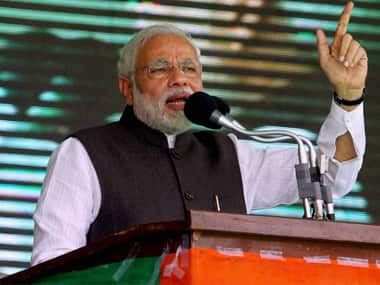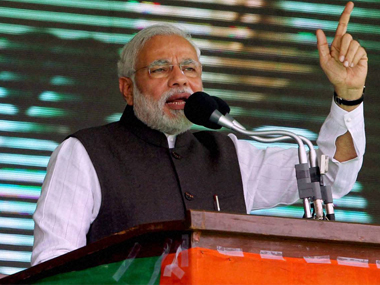The nationalist Bharatiya Janata Party (BJP),which surveys show is on course to win the most seats in an election starting on April 7, is giving the final touches to its manifesto that is likely to be revealed next week. The manifesto willharp on economic revival as its key plank while also promising to build a Ram Mandir in Ayodhya, The Economic Times reported today.
[caption id=“attachment_76035” align=“alignleft” width=“380”]
 Narendra Modi. PTI[/caption]
Narendra Modi. PTI[/caption]
The ET report said themanifesto will stress on a clear and simplified tax structure to avoid Vodafone-like scenarios, and will also offer a road map of timebound clearances and approvals to ensure investors don’t face any unpleasant surprises. But the biggest takeaway is this: the party will specify the time and the costs likely to be involved in fulfilling the promises mentioned in the manifesto, which is being authored by a committee led by veteran leader Murli Manohar Joshi.
“Modi’s message to the manifesto committee was to lay down a clear-cut road map of processes with no scope for ambiguity that could lead to what the BJP derisively refer to as the ‘Jayanthi tax’,” the ET report said .
Earlier Reuters had reported that the party will welcome more foreign direct investment in defence, if elected, but would delay opening up the country’s market of more than 1.2 billion people to international retail chains like Wal-Mart.
The BJP would also introduce a general sales tax and overhaul the financial sector, its manifesto will say.
Party sources told Reuters these concrete steps form the core of a pitch to voters that sets ambitious goals of creating 250 million jobs over the next decade, building up to 100 ‘smart’ cities and constructing a high-speed rail network.
“The manifesto’s priorities, in this order, are jobs, investment, manufacturing and infrastructure,” one BJP official involved in drafting the document revealed to Reuters before its publication next week. He declined to be identified due to the sensitivity of the topic.
The BJP’s candidate for prime minister, Narendra Modi, is campaigning on his economic record in running his home state, Gujarat, where the party trumpets an unemployment rate of less than a third of the national average.
By contrast the incumbent Congress party, which unveiled its manifesto on Wednesday, is appealing to its core constituency of poorer voters who it says should be given the chance to participate in “inclusive” growth.
“Growth by itself is not sufficient,” Prime Minister Manmohan Singh told an event at which Congress president Sonia Gandhi made a rare public appearance to support her son Rahul’s leadership of the party’s flagging campaign.
While the BJP platform seeks to tap into the hopes of 100 million first-time voters whose job prospects have been hurt by a slowdown in economic growth, the tenets of ‘Modinomics’ remain nebulous beyond a broad focus on supply-side reforms.
“Most of these proposals have been discussed by other parties too,” said Shumita Sharma Deveshwar, a director at Trusted Sources, a policy advisory firm. “The key is implementation of these policies. That is the bigger challenge.”
CAUTIOUS OPENING
The BJP’s policy platform takes a cautious stance towards opening up the Indian economy to foreign direct investment.
There will be no quick move to allow the likes of Wal-Mart or Tesco easier entry into so-called ‘multi-brand’ retail, which would pose an existential threat to small traders who form a key BJP constituency.
“The domestic retail industry needs to be first made competitive before allowing foreign investment,” a second BJP source said.
However, the BJP would propose raising a cap on foreign ownership of Indian defence industry enterprises to 49 percent from 26 percent now.
Although India spends only a third as much as China on defence, it is the world’s largest market for arms exports - reflecting a failure of past governments to turn around the state-dominated domestic defence industry.
The legacy of dependence on the Soviet security umbrella has been prolonged by corruption scandals that have held up deals with foreign partners that would have moved production to India.
“We can save huge foreign exchange by producing defence equipment at home,” the source said.
“(We would) raise the FDI cap, (and) allow Indian companies to enter into joint ventures with foreign companies. It could be an arrangement where Indian partners hold the majority stake, say 51 percent.”
Elsewhere, the BJP is expected to propose a national general sales tax - key to getting rid of a hodge-podge of existing levies. More broadly, it will seek to improve tax collection by lowering rates and closing loopholes.
A “broad consensus” exists to overhaul the financial sector to turn India into an international hub, the source said.
Analysts caution that the BJP and its allies, which polls show falling around 40 seats short of a majority, may end up having to strike a series of compromises to cobble together a parliamentary majority.
With inputs from Reuters
)